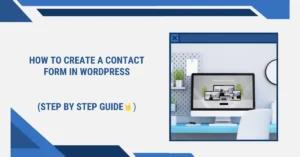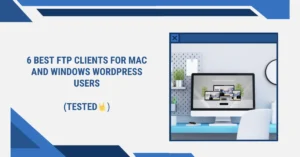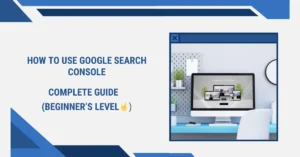Are you interested in learning how to run a website? With self-hosted website builders like WordPress, you may create whatever type of website you want with complete independence.
The problem is that most inexperienced web hosts don’t know how to host websites properly. Many even think that hosting one’s own website calls for certain technological knowledge.
That is just untrue.
It will just take a few minutes to host your own website if you use the proper method. Generally, it’s as simple as setting up a Facebook account.
Without requiring you to gain any technical abilities, we will walk you through every step of hosting a website in this beginner’s guide.
We will also go over the inner workings of everything. This will support you.
Here is what you’ll learn in this guide:
- What Does it Mean to Host a Website?
- What Do You Need to Host a Website?
- Types of Website Hosting Services
- Choosing the Right Plan to Host a Website
- How Much Does It Cost to Host a Website?
- How to Host a Website on Your Computer?
- Putting Your Local Host Server Online
- FAQs about Website Hosting
Table of Contents
What Does it Mean to Host a Website?
Placing your website’s files on a unique computer known as a server is known as website hosting. This machine allows anyone to browse your website by making its files openly available on the internet.
These unique computers have a certain piece of software loaded in order for other individuals all around the world to view the website. We refer to this programme as a web server.
Receiving incoming requests and responding by providing the desired page to the user’s browser constitute the fundamental duties of a web server.
It’s true that all of this sounds like a lot of technical jargon.
To host your website, you do not, however, need to become proficient in all of these areas.
Fortunately, thousands of businesses provide this as a service (for a nominal fee).
Every website on the internet is hosted by a web hosting provider. Third-party service providers are used for hosting even by digital giants like Netflix (hosted on Amazon) and PayPal (hosted by Google Cloud hosting).
Only a few businesses, like Amazon, Microsoft, and Google, fully host all of their services on their own platforms.
What Do You Need to Host a Website?
To host a website, you will require the following two items:
provider of web hosting services
Name of domain
You can host your website on ready-to-use web servers from web hosting service providers. They handle all the technical details and give website owners simple-to-use tools for hosting management.
How do people access your website that you host yourself now? Domain names are useful in this situation.
The address of your website that users enter into their browser to access it is known as your domain name. wpbeginner.com, for instance, will direct you to this page.
In essence, a domain name serves as a user-friendly means of establishing a connection between browsers and the website server that is linked to that domain name. See our guide on what is a domain name and how domains operate for more information.
One of these leading domain registrars is where you can buy a domain name. These businesses are authorised to offer domain name registrations for sale.
See our tutorial on the distinctions between web hosting and domain names to learn more about the relationship between your web host and domain.
Note: We will demonstrate how to obtain a domain name for free later in this article.
Let’s first examine several web hosting plan kinds and choose which one would be best for hosting your website.
Types of Website Hosting Services
Every website is not created equal. While some are larger, with more visitors and information, others are smaller, with less traffic.
Disc space and bandwidth are two things that are less needed for a smaller website. However, in order to function properly, a bigger and more well-known website will require more resources.
Different hosting packages are offered by website hosting firms to meet the needs of different kinds of websites. These are a few of the most popular choices for hosting.
1. Shared Hosting
Small websites, blogs, and newly established small enterprises can all benefit from shared hosting.
By permitting several websites to use the same server resources, they are able to reduce their expenditures. This lowers the cost of website hosting.
Pricing: $1.99 to $7.99 a month to begin with
Ideal for: Launching a brand-new blog or tiny company website.
Bluehost and Hostinger are the shared hosting companies we advise.
See our guide on the best shared web hosting options for the truth for additional information.
2. VPS Hosting
Even with VPS (Virtual Private Server) hosting, shared hosting is still used. To manage significant increases in traffic, it does, however, provide a configurable set of resources.
For your website, you receive a private server that is divided and controlled via your hosting management panel. This combines the flexibility of dedicated resources with the low cost of shared hosting to give you the best of both worlds.
Price: $29.99 per month to start
Ideal for: Well-known blogs, eCommerce sites, and medium-sized enterprises.
HostGator is the VPS hosting provider we advise using.
See our post about when your website needs VPS hosting for more information.
3. Managed WordPress Hosting
A dedicated hosting solution designed only for WordPress is called managed WordPress hosting. It functions similarly to a WordPress website concierge.
With a managed hosting platform, your website’s updates, backups, and caching are handled by the hosting provider. This frees you up to concentrate on developing content and expanding your company.
Pricing: $35 a month to begin with
Ideal for: Well-known blogs, membership websites, and company websites.
WP Engine and SiteGround are the managed WordPress hosting companies we advise.
See our post outlining when managed WordPress hosting is actually necessary for more information.
4. Dedicated Hosting
With a dedicated server hosting, your own website has exclusive use of the entire server. You receive full access to the server’s resources, sophisticated management tools, software installation capabilities, and even your own operating system.
As you’ll be handling your own server, some technical know-how might be necessary. For larger websites that require great performance to handle increasing traffic volumes, this is an advanced option.
Pricing: $79.99 a month to start
Ideal for: eCommerce stores, highly trafficked websites, and enterprise-level companies.
SiteGround or HostGator are the dedicated hosting providers that we suggest.
Note: The WPBeginner website is hosted on bespoke dedicated servers from SiteGround.
For a visual comparison, we have created an infographic that you can use to pick the best type of web hosting.
Choosing the Right Plan to Host a Website
As you can see, the cost and server settings for each hosting plan vary. You must select a plan based on your financial situation and needs.
At WPBeginner, we advise customers to begin with a shared hosting plan at a lower cost and then upgrade as their company expands.
By doing this, you can cut costs and only pay for the services that you genuinely require. For a detailed breakdown of all the expenses and advice on how to start saving a tonne of money, check out our post on the cost of constructing a website.
The monthly cost of shared hosting plans is $7.99 (paid annually), and the cost of a domain name is $14.99.
Now, this is still a substantial investment if you are just getting started.
Fortunately, Bluehost has consented to provide our users with a complimentary domain name and a hosting discount. Basically, it will only cost you $1.99 a month to get started.
They are among the biggest hosting companies globally and come highly recommended by the official WordPress web hosting directory. They provide excellent customer service along with a free SSL certificate.
See our comparison of the top hosting providers for further shared hosting options.
Making your website comes next after you have registered for a hosting account. Check out our how to create a website guide for comprehensive instructions.
How Much Does It Cost to Host a Website?
We have already discussed web hosting company costs. However, a number of variables might affect how much hosting a website costs.
The hosting plan you select comes first. Starting with less expensive shared hosting plans, we advise you to upgrade as your website and business expand.
After you begin the process of creating a website, you could also need to pay for additional services, software extensions, and website layouts.
Buying exactly what you truly need and making use of free tools whenever possible would be your objectives.
We have a great tutorial that explains how much it costs to design a WordPress website and how to stay under budget.
How to Host a Website on Your Computer?
Can I host a website on my computer? is a question that many of our consumers ask us.
You certainly can.
That being said, you should only host a website locally in order to test it before putting it live on the internet.
A lot of novices find that setting up a local server on their PC is a useful way to learn WordPress, web development, and code.
Check out our guides on configuring a local server on Mac and Windows.
By doing this, you’ll be able to set up a local server without opening it to the public.
We do not advise hosting a website on a local server and making it accessible to the public. But for those that aren’t, we’ll walk you through the process step-by-step for users who are feeling adventurous.
Putting Your Local Host Server Online
A website that you host on your home server will only be accessible by you. To get your website up and running, you’ll need to adjust its settings.
First, find the httpd.conf configuration file for your web server software.
It is located in the C:\wamp\bin\apache\apache[version#]\conf] folder if you are using WAMP on Windows.
It is located in the /Applications/MAMP/conf/apache/ folder for Mac users of MAMP.
A simple text editor such as Notepad or TextEdit can be used to open this file. Next, you must locate the line that starts with
Pay attention to 80
It must be changed to reflect your IP address and port number. Just searching for “what is my IP address” on Google will provide your IP address. You will then see a string of numbers divided by dots. This is an illustration of how that code with your IP should appear:
64.233.160.1:80 I hear you.
The next line that you must locate is this one:
80 is the server name for localhost.
Change it by entering your IP address in place of localhost:80.
This server is 64.233.160.1.
The next line for WAMP is the one you need to locate:
“c:/wamp/www/” is the directory.
If you’re using MAMP, search for the line that says “
“/Applications/MAMP/htdocs” directory
The access permissions are shown below this line; you must change them to the following:
Order Accept, Deny Permit from Every
Now that the permissions have changed, you can restart your local server and save your configuration file.
Instead of using localhost to view your website, anyone can now do so by using your IP address. It would be difficult for your users to remember the IP address, thus this is not ideal.
This is when having a domain name is useful.
Pointing Your Domain Name to a Locally Hosted Website
Users can access a website hosted on your computer by pointing their domain name to it, just like they would any other website.
The DNS settings for your domain name must first be changed. Domain.com is what we use.
The next step is to modify the A name record by replacing the Name with a @ symbol. To continue, click the “Add new record” option if you don’t already have one.
To save your changes, enter your computer’s IP address in the value field and select the “Update DNS” option.
You’re done if the PC that houses your local server is directly linked to the internet.
The design of your router’s interface may vary slightly depending on the manufacturer. Locate the setting marked “port forwarding,” “virtual server,” or “NAT.”
The next step is to route HTTP or web traffic to port 80. You must input your computer’s IP address on the local network in the IP address area. The internal address that uniquely identifies your computer on the local network is this IP address.
Following that, you must restart your router and apply the modifications.
Disadvantages of Hosting a Website by Yourself
It is not a good idea to host your website on a local computer. For this reason, even the largest tech companies—those with ample funding, expertise, and experience—choose to work with hosting service providers.
A few drawbacks of using a local computer to host a website are as follows:
- In order to run a web server, you need to put it on a computer connected to a high-speed internet connection 24 hours a day.
- You also need to configure and install updates for the web server software, keep backups, plan on a backup server, and more.
- The computer hosting your website will also be open to hacking attempts, malware injection, and DDOS attacks. This could also affect the security of all other computers on your network.
- You will need to purchase a static IP address from your internet service provider, which will cost you extra.
It will take a lot of time, energy, and technological know-how to complete all of this. For this reason, hosting your website on a local PC by yourself is not a good option.
FAQs about Website Hosting
Having helped thousands of beginners start their own websites, we have heard every possible question. Following are some of the most commonly asked questions from people who want to host a website.
1. Why do I need a hosting provider to host a website?
The upkeep of website servers is the area of expertise for hosting service providers. They employ engineers and system administrators who keep a round-the-clock eye on their servers.
This frees you up to concentrate on developing your website and expanding your company rather than handling server software.
2. How do I host my own website?
LocalWP, WAMP, or MAMP can be used to host your own website on your PC. You can use any of these programmes to run a local server on your PC. On the other hand, nobody else will be able to view your website; it will only be available to you. It must be moved to a hosting service provider in order for it to be accessible to the general public.
3. Can I buy a domain name and hosting from two companies?
Of course you can. However, if you buy both from the same company, you may control both of them from the same dashboard. Furthermore, some businesses, such as Bluehost, provide free domains to prospective clients in an effort to get them to utilise their services.
4. Can I buy a domain name and host my website later?
Yes, you can buy a domain name alone. However, it will not be pointing to your website until you choose a hosting provider.
We recommend Domain.com for registering a domain name. They offer beginner-friendly domain management tools, which will make it easy to connect your domain to any hosting provider later.
You can also use our Domain.com coupon code to get an additional 25% off new domain registrations.
5. How can I host my website for free?
Using one of the many free website hosting companies, you can host your website for nothing. These businesses, however, might place advertisements on your website, impose traffic restrictions, force you to use their platform exclusively, or upsell you on additional goods and services.
6. Can I host my website on my local computer and later move it to a hosting provider?
You can accomplish that, yes. It is preferable to begin with a hosting company, nevertheless, if you are serious about launching a website.
7. Can I host a website with one provider and then change it to another provider?
Yes, you are free to transfer your website at any moment to any other hosting provider. For comprehensive instructions on how to transfer your website to a new host, see our page.
8. Where do I host my website?
It might be challenging for novices to select the best hosting company because there are so many of them available.
We have collaborated with every top web hosting provider in the industry throughout the years. We now know more about what constitutes a quality hosting platform thanks to this.
Our recommendation for a starting website is Bluehost. They come with built-in caching, security, an intuitive dashboard for beginners, and more. They also install WordPress instantly. Additionally, they are providing users of WPBeginner with a free domain name in addition to a hosting discount.
See our comprehensive list of the top hosting providers, along with pros and disadvantages, for additional suggestions.
A few businesses provide free site hosting, but we advise you to proceed with extreme caution while dealing with them.
We hope that this post has given you more knowledge about website hosting. See our instructions on obtaining a free business phone number and email address for your website if you’re interested.







